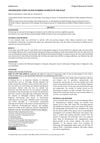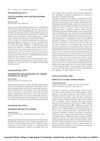August 2023 in “Annales de Dermatologie et de Vénéréologie” Non-scarring hair loss in lupus patients often responds well to treatment and doesn't lead to scarring.
 June 2023 in “International journal of pharmaceutical quality assurance”
June 2023 in “International journal of pharmaceutical quality assurance” Videodermoscopy is effective for diagnosing different types of non-scarring hair loss.
 May 2023 in “Research Square (Research Square)”
May 2023 in “Research Square (Research Square)” Wearing a hijab may lead to earlier hair loss due to vitamin D deficiency and scalp conditions.
March 2023 in “Nigerian Journal of Clinical Practice” The main difference in hair loss for lupus patients is smaller and fewer sebaceous glands.
 December 2022 in “Cureus”
December 2022 in “Cureus” Low iron levels are linked to hair loss in women.
 November 2022 in “Skin health and disease”
November 2022 in “Skin health and disease” People with hair loss conditions often have more mental health issues like depression and anxiety compared to those without hair loss.
 September 2022 in “Nepal journal of dermatology, venereology & leprology”
September 2022 in “Nepal journal of dermatology, venereology & leprology” Nepalese patients with hair loss, especially women and those with androgenetic alopecia, experience a significant decrease in quality of life.
 July 2022 in “المجلة العراقية للصيدلة”
July 2022 in “المجلة العراقية للصيدلة” Most women with excessive hair growth (hirsutism) also experience a common type of non-scarring hair loss called Androgenetic alopecia with telogen effluvium.
 January 2021 in “Our Dermatology Online”
January 2021 in “Our Dermatology Online” A young man's hair loss was the only sign of syphilis, which improved after treatment.
 December 2019 in “Дерматологія та венерологія”
December 2019 in “Дерматологія та венерологія” Trichoscopy is a useful tool for diagnosing hair and scalp disorders.
 October 2018 in “Vestnik dermatologii i venerologii”
October 2018 in “Vestnik dermatologii i venerologii” Certain growth factors affect hair loss in women and could be targeted for treatment.
 April 2018 in “Journal of Investigative Dermatology”
April 2018 in “Journal of Investigative Dermatology” Topical tofacitinib is effective in promoting hair growth for non-scarring alopecia.
 October 2017 in “Iranian Journal of Dermatology”
October 2017 in “Iranian Journal of Dermatology” Clinical exams are good for diagnosing some women's hair loss, but lab tests aren't always needed.
 August 2017 in “Journal of evolution of medical and dental sciences”
August 2017 in “Journal of evolution of medical and dental sciences” Trichoscopy is effective for diagnosing different types of non-scarring hair loss.
 January 2014 in “Pathology”
January 2014 in “Pathology” Non-scarring hair loss can be diagnosed with two 4mm punch biopsies, one cut vertically and the other transversely.
 3 citations,
January 2013 in “Journal of the European Academy of Dermatology and Venereology”
3 citations,
January 2013 in “Journal of the European Academy of Dermatology and Venereology” The document suggests that severe hair loss in SLE patients may be an early sign of scalp DLE, treatable with immunosuppressive therapy.
16 citations,
January 2020 in “Annals of the rheumatic diseases” Baricitinib might help treat hair loss in lupus patients, but more research is needed.
 15 citations,
December 2011 in “Journal of the European Academy of Dermatology and Venereology”
15 citations,
December 2011 in “Journal of the European Academy of Dermatology and Venereology” Hair loss in systemic lupus erythematosus patients is unique and improves with treatment.
 October 2024 in “Frontiers in Nutrition”
October 2024 in “Frontiers in Nutrition” Vitamin D deficiency is common in people with certain types of hair loss, like alopecia areata and female pattern hair loss.
 April 2023 in “Our Dermatology Online”
April 2023 in “Our Dermatology Online” Trichoscopy is effective in diagnosing trichotillomania by showing specific hair patterns.
 6 citations,
April 2021 in “Frontiers in Immunology”
6 citations,
April 2021 in “Frontiers in Immunology” A patient with lupus and long-term hair loss saw significant hair regrowth after using the drug tofacitinib.
 September 2023 in “Медицинский совет”
September 2023 in “Медицинский совет” Minoxidil effectively treats stress-induced non-scarring hair loss.
May 2018 in “Journal of advanced research in medicine” The document's conclusion cannot be provided because the document is not accessible or understandable.
 14 citations,
November 2020 in “International Journal of Molecular Sciences”
14 citations,
November 2020 in “International Journal of Molecular Sciences” Advanced therapies like gene, cell, and tissue engineering show promise for hair regrowth in alopecia, but their safety and effectiveness need more verification.
 February 2024 in “Biomedicines”
February 2024 in “Biomedicines” Hormones like androgens, estrogen, thyroid hormones, and stress hormones can contribute to hair loss, and treatments target these hormonal imbalances.
 November 2024 in “Skin Appendage Disorders”
November 2024 in “Skin Appendage Disorders” Telogen effluvium most affects quality of life in alopecia patients.
 1 citations,
December 2015 in “Vestnik dermatologii i venerologii”
1 citations,
December 2015 in “Vestnik dermatologii i venerologii” Patients with non-scarring alopecia often experience emotional disorders like depression and stress.
 October 2022 in “Benha Journal of Applied Sciences”
October 2022 in “Benha Journal of Applied Sciences” People with non-scarring hair loss have higher levels of DKK-1, a protein linked to hair growth, than those with scarring hair loss or no hair loss.
 March 2021 in “CRC Press eBooks”
March 2021 in “CRC Press eBooks” Hair loss without scarring is more common than permanent hair loss with scarring, and is often due to genetic factors.
 2 citations,
January 2021 in “Przegląd Dermatologiczny (1959)”
2 citations,
January 2021 in “Przegląd Dermatologiczny (1959)” The article discusses various treatments for different types of non-scarring hair loss.

























